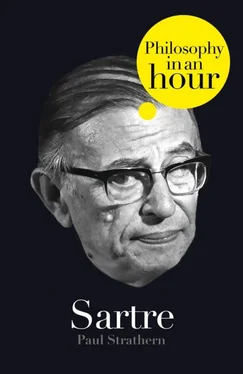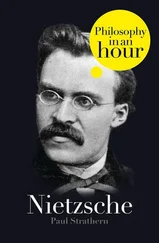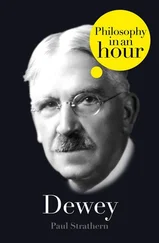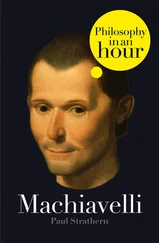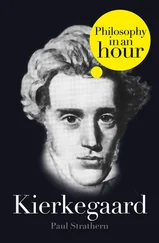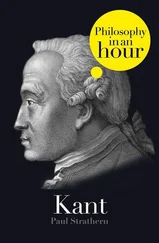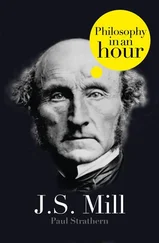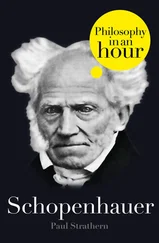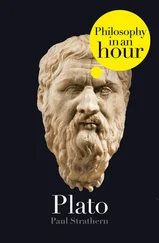Paul Strathern - Sartre - Philosophy in an Hour
Здесь есть возможность читать онлайн «Paul Strathern - Sartre - Philosophy in an Hour» — ознакомительный отрывок электронной книги совершенно бесплатно, а после прочтения отрывка купить полную версию. В некоторых случаях можно слушать аудио, скачать через торрент в формате fb2 и присутствует краткое содержание. Жанр: unrecognised, на английском языке. Описание произведения, (предисловие) а так же отзывы посетителей доступны на портале библиотеки ЛибКат.
- Название:Sartre: Philosophy in an Hour
- Автор:
- Жанр:
- Год:неизвестен
- ISBN:нет данных
- Рейтинг книги:4 / 5. Голосов: 1
-
Избранное:Добавить в избранное
- Отзывы:
-
Ваша оценка:
- 80
- 1
- 2
- 3
- 4
- 5
Sartre: Philosophy in an Hour: краткое содержание, описание и аннотация
Предлагаем к чтению аннотацию, описание, краткое содержание или предисловие (зависит от того, что написал сам автор книги «Sartre: Philosophy in an Hour»). Если вы не нашли необходимую информацию о книге — напишите в комментариях, мы постараемся отыскать её.
Sartre: Philosophy in an Hour — читать онлайн ознакомительный отрывок
Ниже представлен текст книги, разбитый по страницам. Система сохранения места последней прочитанной страницы, позволяет с удобством читать онлайн бесплатно книгу «Sartre: Philosophy in an Hour», без необходимости каждый раз заново искать на чём Вы остановились. Поставьте закладку, и сможете в любой момент перейти на страницу, на которой закончили чтение.
Интервал:
Закладка:
It was now that Sartre suffered from the accident that was to mark his appearance for life. While on a seaside vacation he caught a cold. In those days the medical profession had a respectability that far exceeded its actual ability, and the young boy’s cold was allowed to develop disastrous complications. As a result, Sartre suffered from leukoma in his right eye, which led to strabismus and a partial loss of vision. In brutal unmedical language, he now had a grotesque squint, with one all-but-blind eye left in a permanent oblique stare. But solipsism can soon overcome even such blemishes, and Jean-Paul’s childish idyll continued.
Then something really awful happened. His mother had the thoughtless effrontery to marry again. Jean-Paul was horrified. He was no longer the center of Anne-Marie’s attention, and the new Madame Mancy moved to faraway La Rochelle with her usurper-husband Joseph. At the age of twelve, the awkward, wall-eyed child traveled to the port of La Rochelle to live with his mother and Joseph Mancy. In Sartre’s autobiography (written in his fifties) his forty-three-year-old stepfather is remembered with a vividness that speaks of deep feeling. ‘My mother did not marry my stepfather for love… he was not very pleasant… a tall thin man with a black moustache… uneven complexion… very large nose.’ The authoritarian and utterly bourgeois Monsieur Mancy was ideally cast for the role of the wicked stepfather. He was rich, lived in an opulent mansion, and was an eminent citizen in a provincial city of impeccable provincial complacency. Joseph Mancy was president of the local Delaunay-Bellville shipyards. He ran his business efficiently, in old-fashioned capitalist style. (Any threat of a strike was preempted with a lockout, until hunger resolved the issue.) Every evening after work he would call his stepson into the glittering front salon where he would give him additional lessons in geometry and algebra. In keeping with his general demeanor Monsieur Mancy preferred the orthodox approach to teaching. Persistent failure to arrive at the correct answer would result in a slap.
Meanwhile the little prig in his smart Parisian knickerbockers was greeted with whistles of derision by his less fashionable fellow pupils at the lycée. This baptism of fire induced self-sufficiency and introversion. Sartre was not one to be cowed by bullies. His undefeated egoism developed into a full independence of mind.
The more perceptive among his classmates recognized that the short, puny dandy who had a face like a frog possessed an exceptional mind – despite the fact that he didn’t excel in exams. (Possibly as a direct result of his stepfather’s insistent tutoring, France’s best mind of his generation usually settled about a third of the way down from the top of his class.) Sartre occupied the traditional double role of resident genius and class scapegoat. He was the unpleasant spotty little character in glasses who knew everything (and made sure everyone knew this); but he had also developed the revealing habit of making blunders. One anecdote will suffice.(Characteristically the source is Sartre himself, forty years later.) Like all the other boys at the lycée, Sartre would fantasize about the women in the port’s red-light district. His exceptional imagination had soon outclassed the rather paltry exploits of his teenage classmates. ‘I told them that there was this woman with whom I went to the hotel, that I met her in the afternoon, and that we did what they said they did with their whores… I even asked my mother’s maid to write me a letter: ‘Dearest Jean-Paul… ’ They guessed my trick… I confessed… and became the laughing-stock of the class.’
These were tough times. World War I had broken out, and many of Sartre’s fellow pupils were living alone with their mothers, their fathers having been called to the front. The carnage in the trenches took its toll, and his bereaved classmates took out their grief-fueled aggression on anyone perceived to be in a position of weakness. Sartre developed a mental toughness as well as a certain ambivalence. He refused to conform just to join a gang of thoughtless idiots, but he longed to be accepted. He wanted to be popular, but on his own terms. This ambivalence too would remain lifelong.
But in the privacy of his room the little frog-face with the walleye would become a prince. Seated at his desk, the boy who kept consoling himself – ‘I am a genius’ – was already starting on the impossible task of becoming one. The exercise books filled with tales of romantic chivalry had given way to autobiographical texts. And now he began to write entire novels. By the age of fourteen he had completed his second novel, Goetz von Berlichingen, about a medieval German tyrant. This reaches its climax when the tyrant’s subjects rise up against him, destroying the local mills and weaving shops (some of which bear more than a passing resemblance to shipyards). The tyrant is finally put to death in ingenious and excruciating fashion. His head is shoved through a hole in a steeple clock, so that it emerges at the roman numeral XII. The tyrant sweats out his last moments of life in increasing anguish as the arm of the clock rises second by second toward the point where it will decapitate him at noon.
This combination of anguish, violence, and mortal extremity were to be hallmarks of the mature writer, in whose works they retain all the immediacy of adolescent angst. The intense teenage growing pains that Sartre now experienced were to leave an indelible mark. At this age such feelings are often inextricably mixed with awakening philosophical questioning. Part of Sartre’s genius was his ability to retain this combination and the emotional-intellectual force it generates in a young mind growing into awareness and bewilderment.
In 1919 Sartre began stealing money from his mother’s purse. This he used to curry favor with his classmates, buying them exotic cream cakes and rum babas at a smart local café. Sartre’s joy at his popularity, the sickly taste of the cakes, is undermined by guilt and uncertainty, an underlying sourness. Another poignant emotional combination that was to become a recurrent theme: sticky-sweet and nauseous.
Inevitably Sartre’s ruse was unmasked, involving him in further ridicule from his ungrateful school pals and the usual parental rumpus. Some sort of climax was reached, and Sartre volunteered to return to Paris, preferring to live under the iron rule of God the Grandfather rather than that of Mammon the cliché stepfather. Sartre the rebel was now learning to choose where to rebel: which circumstances were best suited to his particular form of rebellion – useful first steps in what was to turn into a lifelong campaign.
At fifteen Sartre became a weekly boarder at the prestigious Lycée Henri IV. He began reading voraciously, absorbing a huge range of literature, much of it beyond his emotional or intellectual comprehension. Meanwhile his writing branched out into notebooks of aphorisms and philosophical speculation. The standard of these pensées can be judged from his definition of love: ‘Desire consists of treating a woman as a means, not an end – love consists of treating a woman as an end, not a means.’ As with so much of this kind of quintessentially French wisdom, his remarks teetered between the spuriously epigrammatic and genuine insight. His philosophy teacher remarked perceptively of his ‘excessive elaboration of insufficiently clarified ideas’ (which remains to this day the orthodox Anglo-American position on Sartre’s entire philosophy).
Sartre passed his baccalauréat (the tough national school graduation exam) and secured a place at the École Normale Supérieur. Contrary to its name, there is nothing normal whatsoever about this school, which skims the cream of France’s university students. A selection of Sartre’s contemporaries here gives an indication of the standard. These included such future stars as the philosophers Raymond Aron and Maurice Merleau-Ponty; the leading anthropologist Claude Levi-Strauss; the finest if most hysterical theologian-philosopher of her time, Simone Weil; the future great director of the École itself, Jean Hyppolyte; and the writer-philosopher Simone de Beauvoir.
Читать дальшеИнтервал:
Закладка:
Похожие книги на «Sartre: Philosophy in an Hour»
Представляем Вашему вниманию похожие книги на «Sartre: Philosophy in an Hour» списком для выбора. Мы отобрали схожую по названию и смыслу литературу в надежде предоставить читателям больше вариантов отыскать новые, интересные, ещё непрочитанные произведения.
Обсуждение, отзывы о книге «Sartre: Philosophy in an Hour» и просто собственные мнения читателей. Оставьте ваши комментарии, напишите, что Вы думаете о произведении, его смысле или главных героях. Укажите что конкретно понравилось, а что нет, и почему Вы так считаете.
